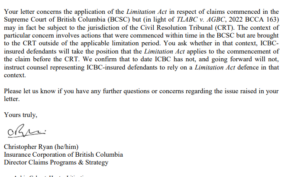A lawsuit was filed today in the BC Supreme Court, Vancouver Registry, seeking to be certified as a class proceeding (commonly referred to as a class action) hoping to represent many gymnasts for suffering alleged physical, emotional and other harm in their sport.
In the lawsuit the Plaintiff, a former BC gymnast, alleges that in years of gymnastics she was exposed to physical abuse including
(a) routine over conditioning, including forced over stretching;
(b) routine hyper extension of the knees by coaches forcibly sitting on athletes’
knees;
(c) forcing athletes to perform skills while injured;
(d) forcing athletes to perform skills beyond their capabilities;
(e) directing and requiring athletes to maintain an unhealthy weight;
(f) inappropriate physical contact, including …having athletes run into
arms and straddle his waist; and,
g) inappropriate physical contact, including …hiking athletes’ suits
higher on an athlete’s legs, hips and buttocks revealing their inner thighs
and buttocks.
Allegations of psychological abuse including:
(a) public berating, yelling and humiliation;
(b) verbal abuse and bullying, including statements such as “are you stupid?”;
(c) body shaming, including public weekly weigh-ins which were often
accompanied by verbally abusive and humiliating statements such as “what
have you been eating?” or “too many cookies this week?”;
(d) controlling and manipulative behaviour which included ignoring athletes
during training and competitions;
(e) depriving athletes of necessary instruction, spotting, assistance and
coaching;
(f) prohibiting parents from attending or observing practice; and,
(g) explicitly instructing athletes to not tell their parents what happened at
practice.
The lawsuit says the Plaintiff suffered harm from these practices, that many other gymnasts did as well from similar practices and the that the sports organizing bodies (Gymnastics Canada and various provincial sporting organisations) turned a blind eye to systemic problems in the sport and should be liable for the harm.
None of the allegations have been proven in court. The Defendants have still have time to formally respond to the allegations.
The lawsuit claims that the sport organizing bodies should be liable under the legal principles of Systemic Negligence, Breach of Fiduciary Duty and Vicarious Liability.
Presently only one plaintiff is formally involved in the filed lawsuit but hopes to certify a very broad class covering
“All gymnasts resident in Canada who claim that they were physically, sexually,
and/or psychologically abused while participating in Gymnastics Canada,
Provincial Member Organization, or Member Club programs, activities, or
events between 1978 and the present”
In recent months many allegations were made from current and former athletes in a variety of organized sports in Canada including not just gymnastics but also boxing, synchronized swimming, rugby, rowing and others.
This lawsuit likely will not be the last flowing form similar allegations across many sports. There will be challenging times, both in and out of court, for provincial and national sport organizing bodies in Canada flowing from these ever growing lists of allegations.
